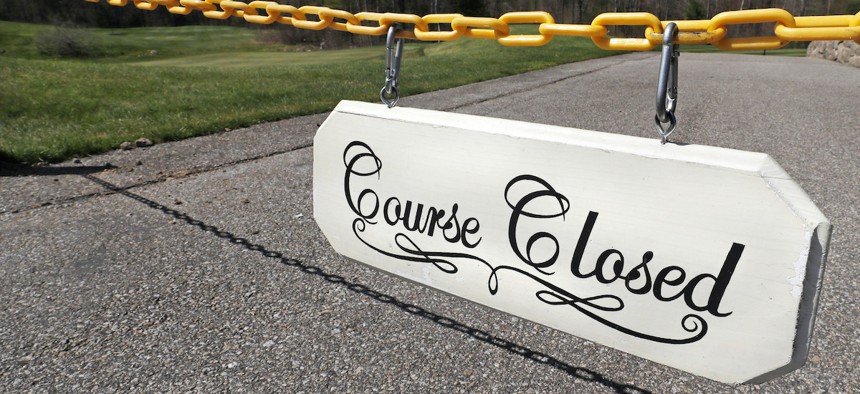New Hampshire Latest State to Try to Limit Out-of-State Tourists

A "Course Closed" sign blocks a cart path leading to the first tee box at the Brookstone Park Golf Complex in Derry, N.H., Tuesday, May 5, 2020. Golf courses reopened to members and state residents Monday. Associated Press
New Hampshire is reopening certain recreational sites, but trying to limit them to residents. Other states have attempted similar measures, with mixed results.
Golf courses and campgrounds are up and running in New Hampshire—but only for state residents or members, according to guidance from Gov. Chris Sununu.
"The people of New Hampshire have taken this epidemic incredibly seriously," Sununu said in a statement detailing his modified “Stay at Home 2.0” order. "We all know you are healthier at home, and that continues to be true, but we are also taking steps to reopen our economy in a smart, step-by-step approach that is supported by facts, science and data."
Under the order, endorsed by the state’s public health officials, both campgrounds and golf courses can open to state residents or people with memberships, defined as “an arrangement that involves a binding and ongoing legal or monetary commitment,” including a seasonal or annual pass, to a particular facility.
Both businesses must also adhere to strict health regulations, including banning gatherings of more than 10 people, frequently cleaning and disinfecting restrooms and other public spaces and requiring employees to wear cloth face coverings. At golf courses, players must report for tee times no more than 15 minutes in advance, may not gather before or after playing and are required to bring their own bags and clubs. At campgrounds, group campsites will remain closed, and no outside visitors are permitted.
The restrictions on out-of-state visitors are meant primarily to deter Massachusetts residents from crossing into New Hampshire for recreational activities, Sununu said. Covid-19 has stayed relatively contained in New Hampshire, with 3,160 confirmed cases as of Tuesday, while Massachusetts has been hit much harder, with nearly 78,500 cases as of Sunday.
“That’s more concerning than anything, to be honest,” Sununu said at a press conference last week. “Now is not the time to be inviting or enticing folks out of Massachusetts to come up and either recreate or vacation up here in New Hampshire.”
Other states have attempted to limit interstate travel during the coronavirus pandemic, with mixed results. New York Gov. Andrew Cuomo in March threatened a lawsuit after Rhode Island Gov. Gina Raimondo issued an executive order that mandated that all New Yorkers who visited her state be quarantined regardless of symptoms. Raimondo repealed the order, and issued a broader one mandating that “any person coming to Rhode Island by any mode of transportation after visiting another state for a non-work-related purpose.”
Last week, a federal judge struck down Kentucky Gov. Andy Beshear’s ban on certain types of interstate travel, which he said were necessary because neighboring states, including Tennessee, had not taken sufficient actions to halt the spread of the virus.
"We have taken very aggressive steps to try to stop or limit the spread of the coronavirus to try to protect our people," Beshear said in March. "But our neighbors from the south, in many instances, are not."
In his ruling, U.S. District Judge William O. Bertelsman said Beshear’s order “did not pass constitutional muster” because it interfered with citizens’ “virtually unconditional” right to travel between states, one that is “firmly embedded in our jurisprudence.”
"The restrictions infringe on the basic right of citizens to engage in interstate travel, and they carry with them criminal penalties," he wrote.
But Bertelsman noted that Beshear’s order could be constitutional with “minor amendments.” He cited travel regulations in Ohio, which restrict interstate travel only by people who intend to stay in the state.
“While the word ‘stay’ is perhaps vague, it certainly implies an intent to remain in the state at least 24 hours, so that persons stopping while driving through the state or changing planes at the airport would not face the risk of being unnecessarily quarantined for 14 days,” he wrote.
The restrictions in Ohio, he added, are “requests for the most part,” and don’t apply to people who “as part of their normal life live in one state and work or gain essential services in another state.”
“Ohio’s rules, therefore, do not appear overbroad and have a rational basis for combating the coronavirus, while still preserving the population’s constitutional rights,” Bertelsman concluded.
Similarly, New Hampshire’s restrictions apply only to select businesses and do not impose penalties for noncompliance.
“It’s really up to the facility to make sure they’re adhering to the rules,” Sununu said at a press conference May 1. “We don’t have stay-at-home police that patrol the state.”
Kate Elizabeth Queram is a Staff Correspondent for Route Fifty and is based in Washington, D.C.
NEXT STORY: Tests to Detect Coronavirus on Surfaces Show Mixed Results





